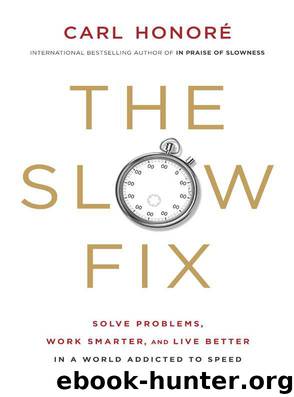The Slow Fix: Solve Problems, Work Smarter, and Live Better In a World Addicted to Speed by Carl Honore

Author:Carl Honore [Honore, Carl]
Language: eng
Format: mobi
Publisher: HarperCollins
Published: 2013-01-28T14:00:00+00:00
CHAPTER NINE
CROWDSOURCE
The Wisdom of the Masses
Many hands make light work.
—John Heywood
Thetta reddast is an expression you hear in Iceland a lot these days. It roughly translates as “Don’t worry. Everything will fix itself.” To some Icelanders, it suggests a dangerous fatalism; to others, a tribute to their native can-do spirit. Either way, this tiny, wind-buffeted island nation in the North Atlantic certainly needed fixing after the global financial crisis in 2008.
Before the crash, Iceland was on the mother of all winning streaks. Its banks and businesses devoured rivals overseas. Its overnight millionaires splashed out on yachts and private jets, super cars, and flashy penthouse apartments. Reykjavik, the dowdy capital, began building the world’s most expensive opera house. Swept up in the carnival of consumption, ordinary Icelanders borrowed and spent like there was no tomorrow. Yet their much-vaunted “economic miracle” was a mirage, a bubble of eye-watering proportions. At the peak of the boom, Iceland’s banks racked up debts worth nine times the nation’s gross domestic product. When the bubble burst, the country was one bailout away from a default.
The carnage of 2008 forced the world to take a long, hard look in the mirror. In many countries, the introspection spurred moves to balance the books and rein in the financial sector. In Iceland the soul-searching went deeper. With a population of 320,000, this is a country with very few degrees of separation—and the feeling of betrayal was intense. Icelanders asked, How could the powers that be—who were in many cases former schoolmates—allow the banks to go so spectacularly off the rails? Why did we lose our way as a nation? A consensus took hold early on that electing a new government, reforming the banking sector, and balancing the budget were just the beginning; what Iceland really needed was to rebuild itself from the ground up.
At the top of the agenda was reforming a political system that had lost touch with the electorate. This problem is not new, nor is it confined to Iceland, home to the world’s oldest parliament. Voters around the world have always found fault with their rulers, but over the last generation distrust of elected officials has spiked. Pollsters find that nowadays four times more Britons than in the 1980s think politicians put their own welfare before the national interest. Even in countries where the economy is in decent shape, such as Germany, the relationship between voters and their political masters has curdled. In 2010 the German Language Society chose Wutbürger, or “enraged citizen,” as its word of the year. It cited voters’ fury over “political decisions made above their heads.”
To tackle this problem at its root, a group of Icelanders came up with a radical solution that will help us understand the next ingredient of the Slow Fix: they invited the electorate to play a direct role in shaping government policy and writing a new constitution.
This sounds like folly. After all, what do most ordinary voters know about crafting legislation, let alone the finer points of
Download
This site does not store any files on its server. We only index and link to content provided by other sites. Please contact the content providers to delete copyright contents if any and email us, we'll remove relevant links or contents immediately.
The Compound Effect by Darren Hardy(8443)
Tools of Titans by Timothy Ferriss(7743)
Nudge - Improving Decisions about Health, Wealth, and Happiness by Thaler Sunstein(7199)
Win Bigly by Scott Adams(6793)
Deep Work by Cal Newport(6493)
Rich Dad Poor Dad by Robert T. Kiyosaki(6120)
Pioneering Portfolio Management by David F. Swensen(6041)
Principles: Life and Work by Ray Dalio(5877)
The Barefoot Investor by Scott Pape(5567)
Digital Minimalism by Cal Newport;(5329)
Grit by Angela Duckworth(5266)
The Slight Edge by Jeff Olson(5176)
Discipline Equals Freedom by Jocko Willink(5136)
The Motivation Myth by Jeff Haden(4967)
You Are a Badass at Making Money by Jen Sincero(4635)
The Four Tendencies by Gretchen Rubin(4402)
Eat That Frog! by Brian Tracy(4105)
The Confidence Code by Katty Kay(3996)
Bullshit Jobs by David Graeber(3793)
